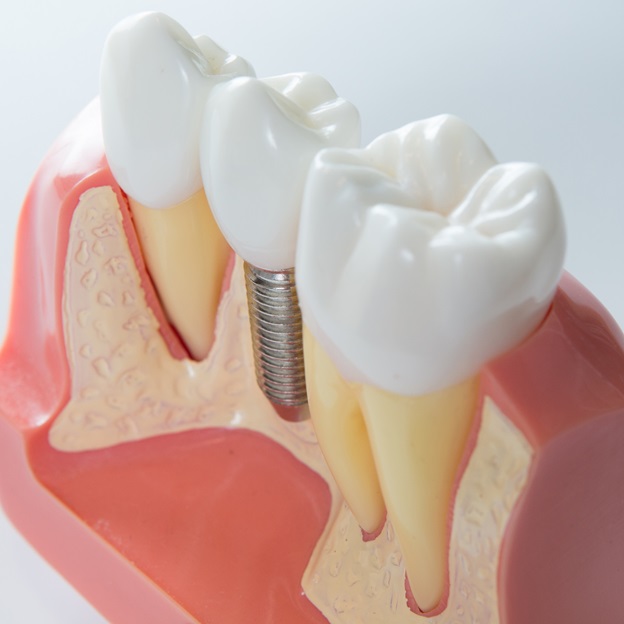Missing teeth has a range of negative implications. Missing teeth can affect the appearance of your smile and it can give you an aged appearance overall. It can make you look much older than you actually are. It can draw unwanted attention to your mouth and become one of the first things that people notice when they meet you. This can affect your self-confidence and your self-esteem. People affected by tooth loss will often hide their smiles behind their hands and even avoid smiling altogether. This can have a negative impact on your mental health and well-being because smiling is very important for good mood, happiness, and even cardiovascular health and a healthy immune system. But there are greater complications in store.
Missing teeth does not simply have aesthetic impact, it also has a huge impact on the health of your remaining teeth. The remaining teeth become crooked and wonky as they try to fill the gap left by the missing tooth. The teeth above it can become loose or the tooth below it can start to protrude. Crooked and wonky teeth have their own complications. They are most likely to be affected by cavities, tooth decay, and gum disease, and they are more prone to wear and tear, chips, cracks and breakage. A missing tooth can also cause bone decay; it is estimated that bone decay occurs at a rate of 25% a year after losing a tooth. This causes other complications, affecting the function of your mouth and making it difficult to bite, chew and enjoy your favourite foods. It can cause pain in your jaw, side of your mouth, headaches, and overall discomfort. It can affect your speech and bone decay can also result in gum recession. In time bone decay will result in further missing teeth.

Dental implants
With a dental implant Melbourne, you can restore the appearance of your teeth and the function of your mouth. You can also stop further bone decay and further missing teeth. A single dental implant Melbourne can replace up to three missing teeth, but if you need to replace all of your teeth, this can be done with four or six implants per arch, depending on your individual dental requirements.
To avoid all the complications of tooth loss you need to speak to a dentist sooner rather than later. The process itself is lengthy. The complete procedure can take approximately six months therefore the quicker you begin the less complications you will face. Unfortunately not everyone is suitable for dental implants. Your dentist will carry out a thorough dental examination as well as take into consideration your medical history to make sure that dental implants are the right choice for you.
To begin with, they will take photographs, x-rays, and an intra-oral scan of your mouth where necessary to be able to assess your dental health fully. This includes making sure that there are no further cavities, tooth decay or gum disease that needs to be dealt with. If any part of the tooth is remaining in the jaw, this will have to be removed, and your dentist will also make sure that you have sufficient healthy jawbone to hold the implant tightly in place. If you have waited for a while before you have contacted the dentist about your missing teeth, then bone loss may have already begun, and this will need to be treated. You will have to find out about a bone graft. The bone graft helps restore the density of your jaw bone. This can either be a minor procedure which takes place at the same time as the implant surgery or if you have significant bone loss then this will have to be done separately and your dentist will have to wait for the bone to heal before you are ready for dental implant surgery.
To undergo dental implant surgery you should have no underlying medical conditions which may affect your body’s healing processes. This means that patients with diabetes, autoimmune disorders, clotting disorders, and other similar complications may have to seek alternative options for replacing their missing teeth. Depending on whether or not your illness is under control, your dentist will put together the correct treatment plan for you. The surgery itself is carried out under local anaesthetic and a further anaesthetic will be given if necessary for example for patients who suffer from dental anxiety or dental phobia. The procedure itself takes approximately 2 hours depending on how many implants you need. Once the implants are in place, they are left to heal by themselves. This process takes approximately six months and then you are ready to replace your missing teeth.
Disclaimer
Any surgical or invasive procedure carries risks. Before proceeding you should seek a second opinion from an appropriately qualified health practitioner.

